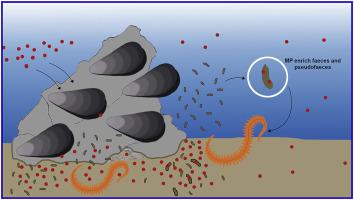Environmental Pollution ( IF 7.6 ) Pub Date : 2020-07-07 , DOI: 10.1016/j.envpol.2020.115151 Stefania Piarulli 1 , Laura Airoldi 2

|
Microplastics (MP) are omnipresent contaminants in the oceans, however little is known about the MP transfer between marine compartments and species. Three connected laboratory experiments using the filter-feeding mussel Mytilus galloprovincialis and the omnivorous polichaete Hediste diversicolor were conducted to evaluate whether the filtering action by mussels affects the vertical transfer of MP of different sizes (MPSMALL = 41 μm; MPLARGE = 129 μm) and densities (polyamide and polypropylene) across compartments and species with different feeding modes. Mussels significantly removed MP from the water column by incorporating them into biodeposits. This effect was particularly evident for the MPSMALL, whose deposition from the water column to the bottom was enhanced (about 15%) by the action of mussels. The incorporation of MP into faecal pellets increased the particles' sinking velocity by about 3–4 orders of magnitude. Conversely, the MP presence significantly decreased the depositional velocities of faecal pellets, and the magnitude of this effect was greater with increasing MP size and decreasing density. The MP incorporation into mussels’ biodeposits also more than doubled the amount of MP uptake by H. diversicolor. We conclude that detrital pathways could be a transfer route of MP across marine compartments and food webs, potentially affecting the distribution of MP in sediments and creating hot-spots of bioavailable MP.
中文翻译:

贻贝有助于将微塑料下沉到底部沉积物中,并随后被碎屑给料器吸收。
微塑料(MP)是海洋中无处不在的污染物,但是,关于海洋舱室和物种之间的MP转移知之甚少。使用滤食贻贝Mytilus galloprovincialis和杂食性polichaete Hediste diversicolor进行了三个相关的实验室实验,以评估贻贝的滤过作用是否影响不同大小的MP的垂直转移(MP SMALL = 41μm; MP LARGE = 129μm)。以及不同饲喂方式下的隔室和物种的密度(聚酰胺和聚丙烯)。贻贝通过将其掺入生物沉积物中,将其从水柱中大量去除。这种效果对于MP SMALL尤其明显,通过贻贝的作用,其从水柱到底部的沉积得以增强(约15%)。将MP掺入粪便颗粒中可使颗粒的沉降速度提高约3-4个数量级。相反,MP的存在显着降低了粪便颗粒的沉积速度,并且随着MP尺寸的增加和密度的减小,这种影响的程度也更大。MP掺入贻贝的生物沉积物中,其对MP的吸收量也增加了一倍以上。我们得出的结论是,碎屑途径可能是MP跨海洋隔室和食物网的转移途径,可能会影响MP在沉积物中的分布并产生生物可利用MP的热点。











































 京公网安备 11010802027423号
京公网安备 11010802027423号